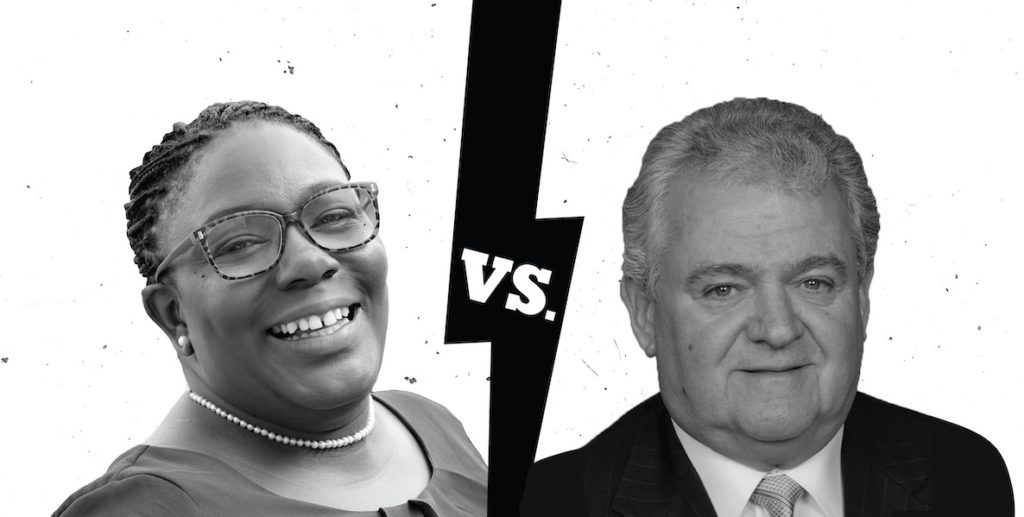Last week, the political machine was jolted awake when Kendra Brooks, one of two Working Families Party candidates for City Council’s two minority party seats, released an open letter accompanied by a flyer to City Committee foot soldiers, announcing the launch of “City Committee for Kendra Brooks”—an attempt to encourage Democratic party stalwarts to endorse her, in keeping with the pithy pitch of her campaign: “Republicans Out, Working Families In.”

Prefer the audio version of this story? Listen to this article in CitizenCast below:

Problem is, the flyer seemed like it was an endorsement by City Committee of Brooks’ campaign, owing to the presence of an official-looking City Committee logo and its pretty unambiguous wording.
Well, that didn’t sit well with a number of Democratic Council incumbents, because, in addition to targeting Republican incumbents Al Taubenberger and David Oh, Brooks’ pitch—backed by their colleague, Helen Gym—actually potentially takes votes away from one of the five Democratic incumbents. (Voters get five votes for seven at-large seats).
So Boss Bob Brady’s cell phone started buzzing, and he came out swinging. “This is a fraud, plain and simple,” he said when I caught up with him. “These Working Family candidates want to get rid of Trump for lying, and now they’re doing what he does.”
In short order, a message from Brady went out to his thousands of foot soldiers: Support Brooks at your peril. The party posted a warning on Facebook that “Party rules state that any Committee Person who backs a non Democrat in the general election shall lose his membership in the said Committee” and Brady spoke of denying any Committee person who endorses Brooks street money or printed ballots on election day.
Along with ward leader and former Controller Alan Butkovitz, he got in the face of State Representative Chris Rabb, who is also a ward leader, for endorsing Brooks.
For her part, Brooks maintains there was nothing underhanded about her campaign’s outreach to Committee people. “We have a coalition from across the city, and that includes some committee people,” her campaign manager Arielle Klagsbrun told me. “We wanted to help committee people support Kendra if they wanted to.”
![]()
If all this sounds like a helluva lot of inside baseball, you are correct. But, on another level, it is deeply significant. This latest political imbroglio raises serious questions about whether Philly politics will double-down on backroom shenanigans and knee-jerk ideology, or whether much-needed reform will make a comeback. Does Brooks represent real change or more of the same?
First, let’s stipulate that Brooks is running an impressive campaign. She’s got a great story to tell, as evidenced by her latest campaign video: In her campaign finance filing today, it’s expected that she will report having raised in excess of $200,000—a record sum for a third party candidate.
Brady dismisses her fundraising prowess by positing that “a lot of her money is coming in from New York”—where the Working Families Party has long flourished—but her campaign says that two-thirds of her donors have contributed less than $50, which suggests there is some grassroots momentum behind her candidacy.
The Republican incumbents and City Committee ought not underestimate Brooks and the other Working Families candidate, Pastor Nicholas O’Rourke, given that “Independent” is actually the fastest-growing party designation in Philadelphia.
That said, is Brooks selling what Philly needs right now? Her candidacy is unabashedly a reaction to Trump: “There is no reason why Trump’s party should be making decisions in our city,” she says in her video. In that, she represents a leftward lurch that doubles-down on ideological shibboleths, as in this response in her questionnaire for Reclaim Philly, ground zero for local Social Democrats:
“There is plenty of wealth in this country and this city. Our problem has never been if we have enough money, but instead if our elected officials have the political courage to check the powers of the 1% and to demand funding for resources for poor and working people. As a City Councilperson, my job would be to demand the 1% pay their fair share for fully-funded schools and affordable accessible housing for all, while also making sure that we pass laws that protect working people from corporations and ensure fairness and dignity at work…As a councilperson, I will always look for laws that lessen and abolish white supremacy and patriarchy in our system, and that uplift Black and Brown people, women and gender non-conforming people. To me, this starts with fully funding our education system, [and] ensuring accessible affordable housing for all people.”
Let’s put aside the fact-checking, save for noting that Philadelphia decidedly does not have “plenty of wealth.” In a city in which more than two-thirds of all jobs created since 2009 pay less than $35,000 a year, we’ve played the redistribution game and have effectively run out of that which to redistribute. Rather than respond to Trump’s soullessness and incompetence with localized versions of Bernie Sanders’ rhetoric, why not talk about what Philly really needs: Good government reform, practical problem-solving and jobs, jobs, jobs.
It’s hard to do any of that by wiping out the local Republican party. Yes, it long ago accepted the crumbs of patronage in return for not really competing politically. But when Gym, Rabb and other prominent Democrats endorsed Brooks and O’Rourke, it was a case study in political naiveté. Gym has rightly railed against Republicans in Harrisburg for underfunding our schools; but it’s infinitely harder to secure said funding increases from the Rs who control the state coffers if you’re explicitly trying to decimate what’s left of their party in your backyard.
It’s a red herring to suggest that our problems will be solved if only we can rid Council of Taubenberger and Oh, neither of whom have actually stood in the way of any recent progressive legislation. Oh, in fact, has been the loudest critic of Republican patronage abuses at the Parking Authority. Yet losing either of them could have dire consequences, not because of what they’ve done, per se, but because of where it leaves Philly: As an island unto itself, unable to count on help from Republicans either at the state or federal levels.
From a campaign standpoint, a “Republicans Out, Working Families In” slogan makes political sense in Trump’s America. But not when it comes to governing. If we want to move the problem-solving needle, at some point you’re going to need the help of people who might disagree with you on some things.
Kids are being kept from going to school because administrators, despite two years to plan, were surprised that asbestos would be exposed during construction at a public school. Mayor Kenney has a record $5 billion budget (to service 1.5 million citizens) yet we’ve just finished our ninth consecutive year of outlandish overtime costs. Meanwhile, an indicted Councilman runs unopposed for reelection and Council won’t even itemize its $16 million a year budget.
In a city that is 40 percent African American, only 2.5 percent of businesses are black-owned, and not only is there no plan for turning that around, it’s not even paid lip service. And don’t even get me started on our worst-in-the-nation poverty, child poverty and deep poverty rates. Given those sets of facts, wouldn’t you think candidates for public office would focus on creating jobs and expanding opportunity, instead of fighting proxy political wars?
We need cleaner government that does the people’s business, not more taxing and spending to feed the City Hall beast—up 25 percent in spending under Jim Kenney, the largest spending spree in our history. How are you feeling about your return on that investment?
The irony here is that, on one level, there is not so much distance between Brady and Brooks. Both run the risk of having their focus diverted from serving us—Brooks by virtue of her tendency to apply progressive talking points to local challenges, and Brady for his fealty to his insider tribe above the average taxpayer; political machines, after all, tend to work for those in them, but their history is spotty at best when it comes to solving problems for the rest of us.
We’ve tried Brady’s way and Brooks’ way; what we really need is a third way in our local politics, a type of progressive pragmatism, and next week we’ll meet an elected official who gets that.


